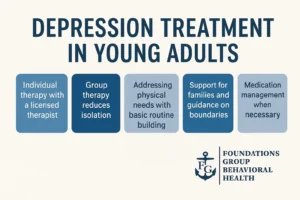If you’re reading this, there’s a good chance your world feels upside down right now.
Maybe your 19-year-old hasn’t gotten out of bed in days. Maybe your 22-year-old left college mid-semester without telling anyone. Maybe your child is living at home, barely speaking, missing meals, or saying things that terrify you.
You’re not imagining it. Something is wrong. And while you may not know exactly what’s going on, your gut is telling you it’s more than a phase.
This is often what depressive disorder looks like in young adults—and Depressive Disorder Treatment may be the next step, even if it feels overwhelming. Understanding what treatment actually involves can help you move forward, one small decision at a time.
If you’re looking for real support in Cape Cod, Foundations Group Behavioral Health offers evidence-based, compassionate care for young adults and families in crisis.
First, We Slow Things Down
Parents in crisis are often stuck in “fix it now” mode—and that urgency makes sense. You’re trying to protect your child. You’re trying to keep things from getting worse.
But the first thing we do in treatment is slow it down. Not because the situation isn’t serious—but because panic doesn’t create safety. We begin with stability and compassion.
The intake process involves a full clinical assessment, but also a relational one. Your child may be emotionally shut down or highly reactive. Our job is to meet them gently, with as little pressure as possible. They don’t need to be ready. They just need to arrive.
The Assessment: More Than a Checklist
Once your young adult enters care, they’ll go through a series of evaluations to determine what kind of support is appropriate. These may include:
- Mood and symptom screenings for depression
- Risk assessments (for suicidal ideation, self-harm, etc.)
- Exploration of anxiety, trauma, or substance use
- Interviews about functioning (school, work, sleep, appetite, relationships)
- Family history and relational dynamics
The goal isn’t just to assign a diagnosis—it’s to understand your child as a full person. We look for what’s underneath the behavior so we can treat the roots, not just the symptoms.
What Depressive Disorder Treatment Looks Like
Every young adult’s treatment plan is customized, but here’s what many of our clients experience at Foundations Group Behavioral Health:
1. Individual Therapy
Licensed therapists provide weekly one-on-one sessions focused on:
- Building trust and emotional safety
- Helping your child understand their depression
- Identifying negative thought patterns and behaviors
- Teaching real-time coping tools for stress and dysregulation
This is where healing begins: in one honest conversation at a time.
2. Group Therapy
In group sessions, clients realize they aren’t the only ones feeling stuck, numb, or broken. With guidance, they practice communication, boundaries, and peer connection in a safe space. Group therapy helps normalize the hard stuff—and reduce isolation.
3. Skill Building and Psychoeducation
We teach emotional regulation, distress tolerance, and daily function support—skills many young adults never learned. This may include:
- How to name and navigate depressive episodes
- Managing low energy days
- Building a basic routine around sleep, meals, and movement
- Setting realistic goals and boundaries
Treatment isn’t about “fixing” your child. It’s about equipping them to handle life in a new way.
4. Family Involvement (With Consent)
We know your child’s wellbeing affects you, too. That’s why we provide:
- Parent check-ins and updates (when appropriate)
- Education about depressive disorder and treatment expectations
- Support around boundaries, communication, and post-treatment planning
We’ll help you learn what to say, what not to take personally, and how to be steady when your child feels like they’re falling apart.
5. Medication Management (If Needed)
Not every client needs medication, but for some, it plays an important role in stabilizing mood. Our psychiatric staff works collaboratively with clients and families to ensure informed choices. Medication is always part of a bigger picture, not the whole plan.
Treatment in Cape Cod: Local Help, Lasting Change
If you’re seeking Depressive Disorder Treatment in Barnstable County, MA, or Falmouth, Foundations Group Behavioral Health offers programs specifically for young adults navigating depression, anxiety, and emotional dysregulation.
Being close to home matters—especially when crisis care transitions into ongoing support. Our clinicians understand local stressors, community dynamics, and the unique pressures young adults in Cape Cod may be facing.
Progress Isn’t Always a Straight Line
Parents often ask, “How will I know it’s working?”
Here’s what progress can look like in depressive disorder treatment:
- Your child starts using words instead of shutting down
- They begin taking care of their body again (hygiene, eating, sleeping)
- Their emotional reactions become less extreme
- They make and keep small commitments
- They stop pretending and start participating
It might not look like joy at first. It might look like neutral. Like calm. Like showing up. And that’s okay. That’s still progress.
Frequently Asked Questions
How do I convince my child to start treatment?
You may not need to “convince” them. Try soft, non-pressuring language:
“I know things have been heavy lately. I found a place that helps people your age who feel this way. We don’t have to decide now, but I wanted you to know it’s an option.”
You can plant the seed. Let us take it from there.
What if my child doesn’t believe in therapy?
Many young adults are skeptical—especially if they’ve had a bad experience before. Our staff is trained to meet resistance with curiosity, not confrontation. Sometimes just one validating conversation is enough to shift the narrative.
Will I be involved in the treatment?
With your child’s permission, yes. We keep parents informed and supported. If your child is over 18, we honor their confidentiality—but we also encourage family engagement wherever it supports healing.
What if depression isn’t the only issue?
Many young adults present with overlapping struggles: anxiety, trauma, substance use, academic burnout, or identity confusion. Our programs are built to address co-occurring concerns—not just one label.
How long does treatment take?
Treatment duration depends on severity, needs, and response to care. Some young adults stabilize quickly. Others need longer-term support. We’ll walk with you through each phase and adjust the plan as needed.
Is help available near us?
Yes. Foundations Group Behavioral Health offers Depressive Disorder Treatment in Barnstable County and Falmouth, MA. If your family is in or near Cape Cod, real help is within reach.
You’re Not Alone in This Anymore
If you’re scared, exhausted, or unsure what to do next, we want you to know this:
You’re not overreacting. Your child is not beyond help. And you don’t have to figure this out on your own.
Call 888-685-9730 or visit our Depressive Disorder Treatment program to explore services in Cape Cod, MA. We’re here to answer your questions—even the ones you’re afraid to ask.









